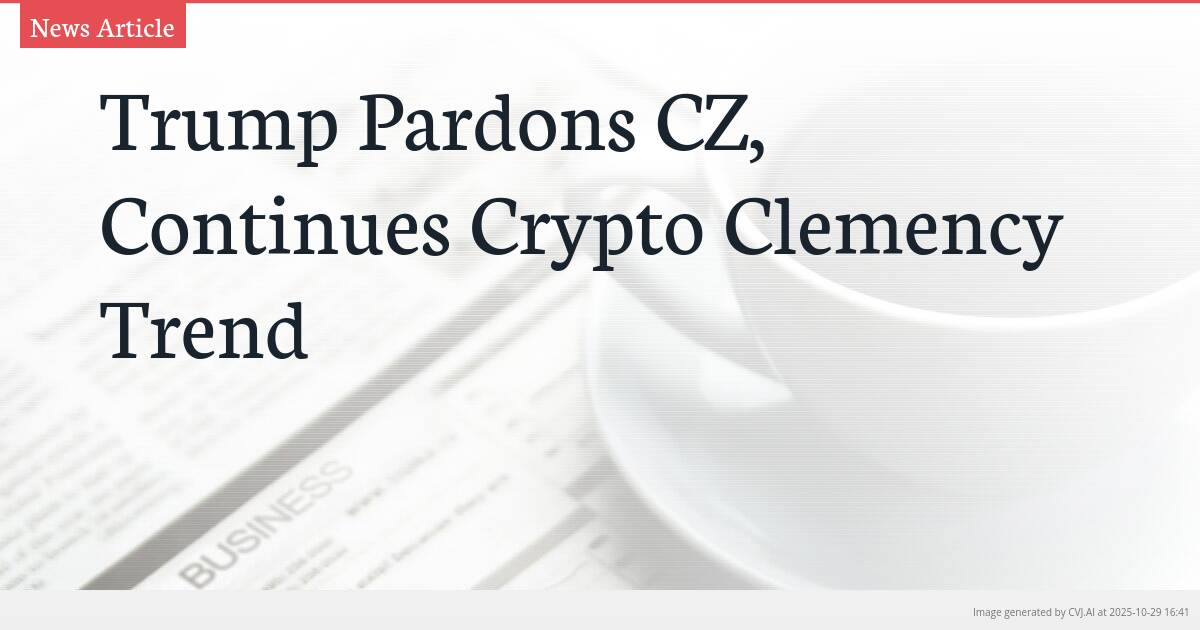This summary text is fully AI-generated and may therefore contain errors or be incomplete.
Introduction
President Donald Trump’s October 21 pardon of former Binance executive Changpeng ‘CZ’ Zhao represents the latest escalation in a controversial pattern of clemency for convicted cryptocurrency industry figures. This marks the sixth major crypto pardon since Trump took office, fulfilling his campaign promise to reverse course on crypto enforcement policies while citing ‘lawfare’ from the Biden administration as justification. The growing list of beneficiaries now includes Silk Road founder Ross Ulbricht and four BitMEX executives, signaling a fundamental shift in federal approach to cryptocurrency regulation and enforcement that has encouraged other imprisoned figures like former FTX CEO Sam Bankman-Fried to seek similar relief.
Key Points
- Trump has now pardoned multiple convicted crypto executives including CZ, Ross Ulbricht, and four BitMEX officials
- The administration cites 'lawfare from the Biden administration' as primary motivation for these clemency actions
- Former FTX CEO Sam Bankman-Fried is among imprisoned crypto figures seeking similar pardons from the Trump administration
The CZ Pardon and Its Implications
The October 21 clemency granted to Changpeng Zhao, widely known as CZ in cryptocurrency circles, represents a significant milestone in the Trump administration’s approach to crypto industry enforcement. As the former executive of Binance, one of the world’s largest cryptocurrency exchanges, Zhao’s pardon follows a pattern that began with Trump’s campaign trail promises to reverse what he characterized as overly aggressive crypto policies. The administration has consistently pointed to what it calls ‘lawfare from the Biden administration’ as the primary motivation for these clemency actions, suggesting that previous enforcement efforts represented political weaponization of the justice system rather than legitimate regulatory oversight.
This pardon carries particular weight given Binance’s dominant position in the cryptocurrency ecosystem and the exchange’s native BNB token, which ranks among the top cryptocurrencies by market capitalization. The move signals to the broader crypto industry that the current administration views previous enforcement actions against major industry players with skepticism, potentially emboldening other executives who might have been hesitant to operate in the United States due to regulatory concerns. The timing of the pardon, coming amid ongoing debates about cryptocurrency regulation and the upcoming election cycle, underscores the political dimensions of these clemency decisions.
Expanding Pattern of Crypto Clemency
The Zhao pardon represents just the latest in a rapidly expanding list of cryptocurrency-related clemencies that began in January with Ross Ulbricht, founder of the dark web marketplace Silk Road. Ulbricht’s case had become a cause célèbre in certain crypto circles, with advocates arguing his life sentence represented excessive punishment for crimes they viewed as non-violent. The administration’s decision to grant clemency to Ulbricht set the stage for what has become a consistent pattern, with four executives from cryptocurrency exchange BitMEX subsequently receiving pardons as well.
This growing roster of pardoned crypto figures illustrates a systematic approach to reversing what the Trump administration perceives as unjust prosecutions from the previous administration. The BitMEX executives, like Zhao, represented major players in the cryptocurrency exchange ecosystem, suggesting the administration is particularly focused on cases involving platform operators rather than individual users or smaller-scale operators. The pattern indicates a deliberate policy shift rather than isolated acts of clemency, with each pardon building precedent for the next and creating expectations within the industry about who might benefit from future clemency actions.
Political Context and Industry Response
The clemency trend reflects Trump’s campaign promises to fundamentally reshape the United States’ approach to cryptocurrency regulation and enforcement. During his campaign, Trump explicitly promised to grant clemency to individuals such as Silk Road founder Ross Ulbricht, making these pardons not just spontaneous acts of executive power but the fulfillment of specific political commitments. The administration’s consistent reference to ‘lawfare from the Biden administration’ provides ideological justification for these actions, framing them as corrections of perceived political persecution rather than mere policy disagreements.
This shift in federal approach has already begun influencing behavior within the cryptocurrency industry, with high-profile figures behind bars making overtures to the Trump administration. Most notably, former FTX CEO Sam Bankman-Fried, whose exchange collapse represented one of the largest crypto industry failures, has reportedly sought similar clemency following the pattern established by the Ulbricht, BitMEX, and now Zhao pardons. The response from the broader cryptocurrency market has been mixed, with some viewing the clemencies as positive for industry innovation while others express concern about the potential for reduced accountability in a sector already known for its regulatory ambiguity.
The ongoing clemency trend raises fundamental questions about the future of cryptocurrency regulation in the United States, particularly regarding how the administration distinguishes between legitimate industry participants and those who have engaged in fraudulent or harmful activities. As the list of pardoned executives grows, the administration faces increasing scrutiny about whether these actions represent a thoughtful recalibration of enforcement priorities or a blanket rejection of previous regulatory approaches. With major industry tokens like BTC and BNB potentially affected by these policy shifts, the financial implications extend far beyond the individual cases to the broader cryptocurrency ecosystem and its integration with traditional financial markets.
📎 Read the original article on cointelegraph.com

